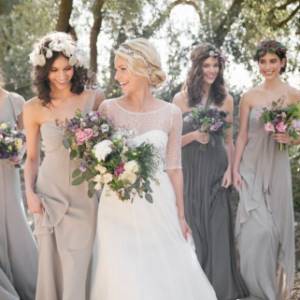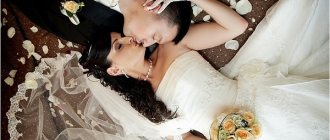It's important to respond to an invitation
Wedding invitations are sent to all guests containing information that is important to them. A beautiful postcard indicates the location of the banquet, the style of the wedding, and any additional conditions, for example, the opportunity to bring children with you.
It is important to be able to read the invitation correctly in order to understand whether you are expected alone or accompanied. If the invitation states that “Marina and Oleg with children” or “the Lebedev family” are invited to the event, it means that they want to see you at the holiday in full, including your children. If the card contains only two names, and nothing is said about the children, then they will need to be left at home.
Only your name mentioned in the invitation indicates that they want to see you alone at the banquet. If there is a number “+1” next to the name, it means that you are allowed to take a companion, which can be any person. Be sure to notify the organizer that you will take advantage of the opportunity to take one more guest with you.
It is strictly forbidden to bring other people to the holiday without permission. The number of guests is calculated in advance, so in this way you will put the newlyweds in an awkward position when they do not have enough space for all the people who come.
After receiving the invitation, thank the newlyweds and confirm your presence at the celebration. If you have unforeseen circumstances that prevent you from attending the celebration, please inform the newlyweds in advance so that they do not take you into account when booking a restaurant.
What to do if someone is dissatisfied with something
One of the most common reasons for judgment at a wedding is the behavior of the bride. A young wife is always required to carefully observe rituals and requirements. But besides them, those present may also have their own thoughts about how the bride should behave at the wedding. And the bride may not agree with these prejudices at all.

The most ambiguous and conflict situations include:
- Bride dance on the dance floor, when a young girl dances freely with everyone. Some lovers of ancient traditions are convinced that the right bride should spend the entire celebration at the table, smiling like an idol, except for the ritual first dance with her husband. This problem can be solved in a simple way - let the toastmaster or wedding host announce that dancing with the bride will bring happiness to everyone. Then the young wife will be able to dance as much as she likes. The main thing is that those who want to get their piece of happiness are not too tired.
- The fatigue of the young wife and her desire to take a break from everyone amid the stormy, hours-long celebration is understandable to many people. But even here you can get a couple of sidelong glances in your direction. Unfortunately, if anyone is unhappy that the bride left the party to sleep on a soft chair for half an hour, then they will have to put up with it. The only thing is that it is best to relax after the formal part of the event is over and a simple entertainment program begins.
- Changing clothes and shoes of the bride or groom in the middle of the celebration into simpler and more comfortable clothes is almost never accepted in Russia. This is largely a European tradition - to get married in one outfit, and dance at the wedding in another. Or even completely - for dancing, take off your elegant sandals and wear simpler sneakers. But little by little, the tradition of dressing up is penetrating Russian weddings. Dissatisfied glances can be avoided in a rather elegant way. Let the toastmaster order special soft slippers or slippers for everyone present. Such slippers, embroidered with a wedding pattern, will serve as a pleasant souvenir, and during the celebration everyone can change their shoes to dance easily and pleasantly. Older guests will appreciate such care for the health of their feet and the safety of their holiday shoes, while young people will regard it as a funny joke.
In any case, the private opinion of one or two people that something is not accepted at a wedding is just their opinion and nothing more. Newlyweds should treat such disturbances with generosity and understanding. And, moreover, you should under no circumstances spoil your holiday because of this.
Dress code for a wedding
Attending a wedding requires strict adherence to the rules regarding the choice of clothing. The dress code for a wedding has its own characteristics. Currently, weddings that have a certain style and are kept in the same color are becoming increasingly popular, from the elements of decorating the banquet hall to the dresses of the bridesmaids. Dresses of the same color for bridesmaids are a feature of foreign weddings. However, recently she has been popular among Russian brides.

Weddings can be themed or in one specific style, for example, Greek. In this case, the newlyweds inform the guests what form of clothing is required of them. These can be dresses and suits of a certain color, or plain accessories that are the same for all guests. The theme of the wedding must be indicated in the invitation so that guests can think about their outfit.
If the wedding is not thematic, but ordinary, you can choose any outfit that does not go against wedding etiquette. Girls can wear both dresses and suits.
It is important to pay attention to the length of the skirts - maxi and midi lengths are preferred. Too deep cutouts on dresses and provocative decorations are considered bad form.
Representatives of the fair sex should look fresh, beautiful and decent, but not overshadow the bride's beauty. According to etiquette, men choose classic suits, the color of which depends on the season. The guest decides for himself whether to complement the suit with a tie or bow tie.
There are restrictions on the color of clothing. Women should not wear white dresses or outfits in shades that match the bride's dress (if the newlywed, for example, chose a beige wedding dress). Black dresses are not welcome at a wedding, but such attire can be chosen if it is decorated with accessories or complemented with faux fur coats.
Men are not allowed to wear black suits with white shirts, or suits of the same color as the groom's clothes. As for shoes, girls can wear shoes, sandals, boots, the main thing is that they are in harmony with the outfit. Small handbags are acceptable: clutches decorated with rhinestones or embroidery are ideal. When creating hairstyles, the use of fresh flowers is not recommended.

Where does a wedding begin?
The ability to adequately organize a special event is not available to everyone. It is necessary to have considerable patience, ingenuity, leadership abilities, a sense of style and tact for the holiday to truly be a success. Rules of etiquette, developed over centuries and decades, help to do without hired managers. They are not something obligatory and immutable, they are only recommendations for action. Moreover, wedding traditions can vary significantly in different countries and among different ethnic groups. Nevertheless, it is worth listening to the wisdom of generations and taking these written and unwritten rules into service, choosing the most suitable ones for a particular situation.
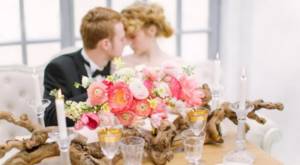
Wedding financing
The first question that arises for the bride, groom and their immediate family is natural: how to distribute expenses for the wedding? Different nationalities resolve this issue in their own way. In addition, there are generalized rules for modern wedding celebrations, which are followed in Russia and a number of countries in Europe and America.
The bride's side pays:
- development of sketches and printing of invitations;
- entertainment events, competitions, hosts or toastmasters, musical groups or DJs;
- bride's wedding attire, including jewelry, additional accessories, pre-wedding procedures, services of makeup artists, hairdressers and stylists;
- design and decor of the celebration venue;
- rental and decoration of vehicles.
The groom's representatives must pay:
- wedding rings for future spouses;
- selection and preparation of the bride's bouquet;
- groom's wedding attire;
- renting a room, ship, site or any other place for an event, or furniture, tables and seating for a party in an apartment in a private house;
- holiday treat.
In the matter of financing wedding events, etiquette allows for arbitrary decisions to be made, depending on the circumstances and agreements reached by both parties. Very often expenses are divided in half. It also happens that the wealthier side takes on the lion's share of expenses. In addition, in the modern world, working newlyweds are increasingly paying for the wedding from their savings in order to arrange the holiday the way they want.
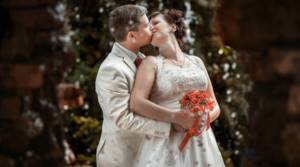
Wedding invitations
Wedding invitations are one of the important components of preliminary preparation. They must correspond to the style of the holiday and contain comprehensive information important for guests. Invitations must clearly and clearly state the following items:
- first and last name (or only the first name, if the relationship is close enough), or family affiliation (for example: “sister”) of the invitee;
- place, date and time of the celebration;
- developed wedding style;
- preferred colors and style of clothing;
- additional important information.
The ability to correctly fill out and read invitations is very important. The organizers of the celebration should make it clear how many people are expected at this invitation:
- one name without any additions means one, specific guest;
- The numbers “+1”, “+2”, etc. next to the name make it clear that a person can come with any companions or companions without going beyond the number limit. Exceeding the specified figure is unacceptable, since the number of seats and refreshments is designed for a certain number of guests;
- several names or the indication “so-and-so’s family” indicate a desire to see those named in their entirety, including children. If the invitation only says the parents' names, but says nothing about the children or family, then they should be left at home.
Having received an invitation, you must thank the organizers and be sure to notify whether it is accepted or not. Also, the newlyweds should be notified if plans urgently change and the invitation has to be cancelled. Or one of the invitees will not be able to go to the wedding for some reason.
The style of invitation can vary markedly, depending on the personal tastes and preferences of the event organizers. Both a humorous and an official tone in the message are allowed, as well as design in the form of original crafts, fabulous landscapes, as much as your imagination allows. However, no matter what form of message is chosen, the invitation should include the following information:
- names of the newlyweds and date of celebration;
- place and time of the wedding ceremony, wedding ceremony and the feast itself. At the same time, Western etiquette allows you to issue separate invitations to these three events. Thus, guests who received an invitation only for official registration cannot attend a banquet or wedding;
- restrictions on dress code or free style of clothing;
- whether the presence of children is allowed;
- deadline for notifying newlyweds of consent or refusal.
These points may be changed or supplemented at the discretion of the organizers. It must be remembered that detailed information in the invitation will protect you from unpleasant situations when guests and holiday organizers will feel at least awkward.

What is customary to give for a wedding?
It is not customary to come to a wedding without a gift, since according to etiquette such behavior is considered bad manners. The most popular wedding gift is a sum of money in an envelope. Wedding etiquette does not set a certain amount for a gift; it depends only on the financial capabilities of the person and his desires. You can give not only money, but an item that no one needs will bring joy to either the newlyweds or the donor.
Find out in advance what newlyweds may need at the beginning of their married life. Maybe you want to donate some equipment or household equipment.
The newlyweds decide for themselves how gifts will be presented. Usually a table is set aside for gifts, and guests give their gifts, toasting the newlyweds at the beginning of the holiday. Large gifts, for example, a stove or a bed, are brought home to the newlyweds; the host only announces the presence of such gifts at the event. According to etiquette, it is not necessary to buy a bouquet of flowers; each guest independently determines whether such a gift is needed or not.
Requirements for the attire of newlyweds and guests
Proper etiquette for invited guests involves strict adherence to the organizers' instructions when choosing outfits. Modern weddings often deviate markedly from traditional traditions. Themed celebrations with original outfits, parties in the same color scheme, luxurious carnival events and holidays in a certain style are organized. To avoid looking like a black sheep, you need to carefully read the dress code requirements. If something is not clear, then call the organizers and clarify what kind of clothes they mean.
The newlyweds, in turn, are required to notify all guests in advance about the dress code requirements. A person must have time to choose or sew a festive outfit. The choice of holiday style offered to modern newlyweds is actually huge:
- Greek, knightly, medieval, Russian, court;
- fantasy, including characters from legends and fairy tales;
- thematic - Hollywood, vintage, rustic, classic, bohemian, glamorous;
- beach and forest;
- color and sea.
The invitation must clarify whether a full suit, dress or some accessory is sufficient. This could be a scarf, belt, gloves, handbag, headdress.
If the wedding is planned to be classic, and there is no special style for the bridesmaids and groomsmen, then the outfits can be chosen at the discretion of the guests. Modern etiquette even allows trouser suits for the newlywed and all the fair sex guests. In this case, you must adhere to the following rules:
- length of dresses and skirts - maxi or midi. You should not come to a wedding in a mini unless it is stated in the invitation;
- too deep necklines, provoking slits in the skirt, transparent erotic outfits and provocatively expensive jewelry are considered bad manners;
- men are recommended to choose the immortal classic, optionally complemented with a regular tie or bow tie;
- lovely ladies should not wear white - this is the color of the bride, as well as outfits that are similar in color to the bride’s dress;
- Women should be careful with the color black. If it is nevertheless chosen, the outfit should be correctly complemented with a fur coat or accessories;
- for men it is forbidden to wear a classic black suit with a white shirt, or any attire that will blend in color with the groom’s outfit;
- beautiful ladies can appear at a wedding in sandals and shoes, boots and boots, over the knee boots and sandals. The main requirement for shoes is that they harmoniously combine with the main outfit and accessories;
- Accessories for women include small handbags, clutches, gloves and hats. For men, this may include canes and hats;
- invited guests are not recommended to create jewelry and hairstyles with fresh flowers - this is the prerogative of the bride.
The basic rule of dressing for women for wedding celebrations is that clothing and jewelry should under no circumstances overshadow the bride. After all, it's her day.
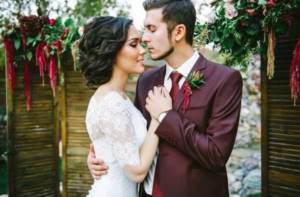
Late
Often the wedding celebration starts late, even though it has been carefully prepared for a long time. According to etiquette, guests being late is bad manners and unacceptable. They should arrive at the place ten to fifteen minutes before the start of the holiday. If guests are late for registration due to unforeseen circumstances, they must sit quietly in the back row, without attracting the attention of others. Be sure to put your mobile phone on silent mode.
Dress code: to introduce or not?
According to etiquette, guests should adhere to certain classical norms (morning dress, black tie, white tie).
Today, the wishes of the newlyweds come to the fore, and traditional black tie may not be appropriate.
Contrary to popular belief, the dress code is not a whim of the couple - it has always been prescribed by etiquette, but many chose to ignore it. Modern weddings, planned to the smallest detail and implying a certain style, simply cannot do without a dress code - any photographer will confirm: no matter how good the decorations are, the lack of a uniform style in the outfits will ruin the whole picture. On top of that, without having recommendations from a couple, you can spend a long time and painfully choosing an outfit and still not get it right - for example, a common mistake is poorly chosen shoes for women (heels literally fall into the ground and a celebration in nature can turn into a disaster for the owner).
Feel free to indicate the dress code in the invitation and provide guests with the necessary details.
| |
Dating and communication
At a wedding banquet you meet many previously unfamiliar people, belonging to different social strata, with different levels of education and upbringing. For this reason, conflicts of various types may arise during a banquet, especially after drinking alcoholic beverages.
Aggressive attacks and inciting conflicts are not only unacceptable, such behavior at a wedding shows complete disrespect for the newlyweds and other guests. At a wedding, everyone is required to behave with the utmost tact and courtesy towards others. Guests get to know each other and communicate on positive topics. You can have casual conversations with your tablemates on abstract topics. It is not recommended to touch upon religion, politics and nationality. You cannot take the bride or groom aside for a conversation, much less detain them for a long time.
If you have any comments regarding the organization of the wedding, you cannot discuss them with other guests. It is necessary to show respect to the people who tried to make the holiday interesting for you.
Competitions and entertainment
Most of the wedding banquet consists of competitions, games and dances. The guest has the right not to take part in all competitions, but it is better to have fun. During the event, you need to demonstrate sincere fun and good mood. You shouldn’t sit at the table all the time, you need to go out on the dance floor, take part in games, laugh and be happy. Do not turn away from the operator filming the video, do not cover yourself with your purse or hand.
The newlyweds are pleased to know that everyone enjoys the holiday, as evidenced by the activity of the guests and their sincere smiles. Newlyweds are always worried about the quality of the banquet, so your task is to assure them that everything is going well and not boring.
Wedding "rich style"
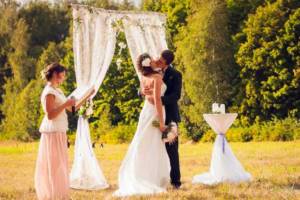
If you have always dreamed of a magnificent celebration for two hundred people, do just that. If you like modest and elegant weddings in a romantic restaurant or in the open air, listening to music with a guitar, don’t think that such a holiday will be less beautiful. Everything ingenious is simple, isn't it?
Rules are truly made to be broken, so don't be afraid to be misunderstood and express yourself, even in moments like organizing your own wedding.
Toast at a wedding according to the rules of etiquette
According to the rules of etiquette, parents of the newlyweds, close relatives and witnesses must make a toast at a wedding banquet. The rest of the guests congratulate the newlyweds if they wish. If you want to make a toast, plan your speech in advance. A long congratulation will not do, which will make the guests tired. A short toast in which you say a few sincere words is appropriate. You should not include poetic works, jokes and other cliches in your speech; the best congratulations for young people will be words spoken from the heart.
The congratulations cannot mention the past relationships of the newlyweds, their state of health, deceased relatives, or any negative events. Also, refrain from making jokes on vulgar topics, do not say anything about a possible addition to the family, and do not make your speech a laudatory ode to yourself.
Features of etiquette
Of course, one of the most delicate aspects of any wedding is the cost of holding it. It is the rules of wedding etiquette that dictate who should pay for what. So, according to them, the groom pays for the rings, a gift, a bouquet for the bride; marriage registration (state fee at the registry office), hotel room for the first wedding night (if provided) and flowers for the wedding. As for the groom's parents, they pay for his wedding suit and a gift for the newlyweds.
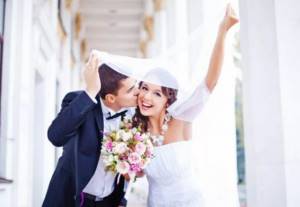
Modern wedding etiquette places more serious expenses on the bride's parents. They, in particular, are supposed to pay the costs of the wedding banquet, the bride's outfit and her dowry, wedding invitations, the services of a photographer, cameraman and toastmaster, dresses and accessories for bridesmaids, as well as transportation. Of course, these are only recommendations: how the costs of a wedding work out is primarily decided by the bride and groom themselves.
According to ancient customs, the groom's relatives had another important responsibility - purchasing all the necessary furniture for the house where the newlyweds were going to live.
Traditionally, when a wedding date is set, invitations are sent to all guests. They are usually made from high-quality white or ivory cardboard.
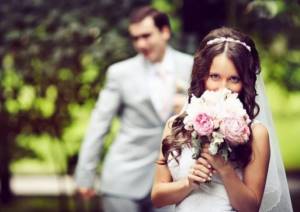
As for the design, it must be simple: there is no need to overload the invitation with all kinds of pictures with rings, doves and hearts. It indicates the location of the ceremony, address, time, day and city. If the place where the wedding will be held is difficult to find for a person who has never been there, then you can add detailed instructions to the invitation on how to get there (you can use a map). You can decorate the text of the invitation with a small beautiful phrase at the end (“The newlyweds will be waiting for you in the winter garden”). Envelopes for wedding invitations must be thick and of high quality; they indicate the addresses of the guests and the address of the bride as the place of departure - it is to this place that gifts are usually sent. About a week before the wedding, it is worth checking with all recipients of invitations whether they will attend the wedding.
Many wedding etiquette rules relate to how all participants in the ceremony should be seated at the table. The newlyweds sit at the head of the table, the wife on the right hand of her husband. The bride's parents sit to the left of the groom, and the groom's parents sit to the right of the bride. Witnesses and honored guests sit next to the parents, then the rest of the ceremony participants. At the same time, when seating, men, according to the rules of etiquette, should alternate with women: the gentleman sits to the left of the lady in order to be able to court her.
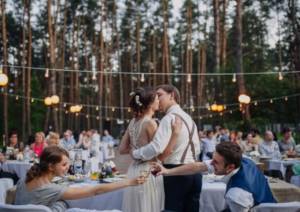
At a wedding there are always special categories of guests - from the groom's side and from the bride's side. They can be mixed or planted separately; it largely depends on the guests themselves. Young people, as a rule, get to know each other easily, and there is no need to separate them. But representatives of the older generation often find it difficult to quickly find a common language with new people, so it is better to place them next to friends. But age is not the only criterion for “wedding” seating of guests: so, sociable, noisy and cheerful people should be seated further away from each other. Thanks to this, they will not compete with each other, but individually will amuse the guests.
Another rule of wedding etiquette states that guests should be seated in such a way as to avoid conflicts between them: jokes about how a wedding without a fight is not a wedding are good only in theory. For example, you should not seat divorced spouses next to each other, the relationship between whom is strained. If this cannot be avoided, then it is worth separating them with at least a bouquet of flowers.
When the “theory” of seating is over, it’s time to move on to practice. So, in order to avoid confusion, the person in charge should have a complete seating chart for the guests, and cards with the names and surnames of the guests should be placed on the tables. By the way, regarding tables: wedding etiquette allows them to be arranged in the shape of the letters “P”, “T” or “W”. At the same time, there should be room for dancing, and the newlyweds should be visible from everywhere.
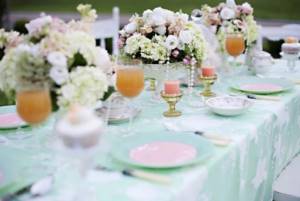
According to the Italian version of the table arrangement, the bride and groom sit on a podium in the center, and the guests sit at tables arranged in a semicircle. The English version is also allowed, in which all participants in the wedding ceremony are seated at round tables of eight people. In this case, separate tables are allocated to the newlyweds and witnesses, as well as parents and grandparents.
During the wedding ceremony, according to generally accepted rules, the bride is always offered her right hand and is helped to sit at the table with a chair. She is the first to be offered champagne, which, according to wedding etiquette, must be drunk to the end during the toast (the main thing is not to overdo it with the portion).

Another feature of wedding libations is that raising glasses too high during toasts is considered bad manners. It is also worth remembering that during the wedding feast you should under no circumstances talk about illnesses or medical topics in general. Finally, the last rule of good manners is that guests must leave the ceremony on time - after all, the wedding day for the newlyweds is always very hectic and takes a lot of energy.
Time to leave
The time spent in a cafe or restaurant is clearly agreed upon in advance; young people pay money for a certain number of hours, so etiquette strictly prohibits guests from staying longer than a certain limit. Such a departure from the schedule will result in additional financial costs for the newlyweds. If you come to a wedding with your children, keep in mind that the little guests will quickly get tired and you will have to go home earlier than expected. Continuing to be at a banquet with naughty kids who cause inconvenience is bad form.
If you are a witness
Nowadays, the presence of witnesses is not at all necessary, but many newlyweds, out of old memory, continue to award a similar title to their closest friends. Witnesses help the newlyweds organize the celebration, actively participate in bachelor and hen parties, and play almost the main role during the bride price. Groomsmen help the bride and groom get ready on their wedding day.
During the banquet, witnesses provide moral support to the newlyweds and help resolve issues that arise if there is no coordinator in charge of the celebration. The bridesmaid has a little more responsibilities, as she monitors the appearance of her friend, helps to go to the restroom, correct her makeup, carries a purse with essentials and a change of shoes. If you have been offered the honorary role of a witness, discuss with the newlyweds in advance what functions you will be assigned.
How should the newlyweds' loved ones behave?
If the actions of parents at a wedding are almost completely regulated by the ritual side of the celebration, then wedding etiquette makes slightly more demands on the witness, as well as friends of the bride and groom, than on any other guests.
As a rule, the outfits of these people make them stand out from the rest of the guests:
- The best man and the witness, who can also be called “best man” and “groomsman,” most often tie a special ribbon on themselves. Or they wear special flowers that are pinned to the buttonhole or bodice of the dress. The friend, like the bride, can choose a dress with a floor-length skirt.
- In a European-style wedding, the bridesmaids and groomsmen, who play a secondary role, often wear the same outfits. So, for the groom's friends, suits of the same color and cut are chosen, and for the bridesmaids, dresses are made to order.
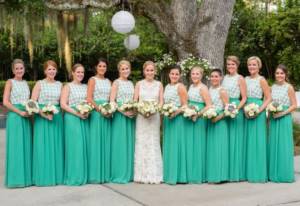
At a wedding, the best man and groomsman are often the main organizers or assistants. According to etiquette, the witness is required to accompany the groom to the bride price, to the registry office, and also at the banquet. In this case, it is the witness who is given the wedding rings for safekeeping.
How a groomsman should behave at a wedding and what duties to perform depends on the wishes of the bride. Usually the most devoted friend or sister is chosen to play the role of groomsman, who helps the bride with choosing an outfit, as well as with hair and makeup on the wedding day. But often a professional stylist is invited for the latter. At the same time, during the wedding, the witness should not remember or somehow illuminate the bride’s past, because what may seem funny to her may be regarded by the groom’s parents as something indecent. And such a disclosure of the past will cause family conflicts, for which the bride will not be grateful.
How should the groom behave at a wedding?
The groom should not be nervous, since he is now the head of the family and is responsible for the overall course of the wedding. In addition, the bride who finds herself in the center of attention needs his support, who may feel awkward and confused, worrying about the appearance and progress of the celebration. The groom supports his beloved, says warm words to her, sends tender glances and is kind to the girl who has received the status of his wife.
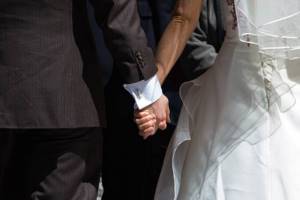
The groom is prohibited from using alcoholic drinks as a sedative. A drunk groom at a wedding is a terrible sight. It's better to give up alcohol completely to have a clear mind, but you can also drink a glass of champagne.
The groom must not be late when he goes to pick up the bride. Any delay can ruin the bride’s mood for the whole day, because a worried girl interprets it differently. In addition, the fact that you will have to rush to the registry office, trying to make it by the appointed time, will not add joy to anyone.
The newly-made husband must support the bride in everything, dance with her, not enter into disputes or conflicts with guests, and participate in a photo shoot.
Preparation for the wedding celebration
Preparatory work includes many stages, so it is recommended to start it several months before the appointed date, and the quality of the wedding depends on how carefully they are thought out.
KNOWLEDGE BASE: Wedding scenario at home - all stages
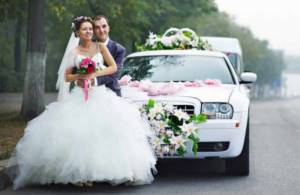
Important stages of preparation for the wedding:
- drawing up a detailed weekly training plan;
- submitting an application to the registry office;
- organization of the wedding ceremony (if it is planned by the young);
- sending out invitations;
- search for toastmaster, photographer, stylists;
- organization of decoration of the wedding procession and banquet hall;
- selection of wedding dresses for newlyweds;
- purchasing wedding rings;
- wedding dance preparation;
- ordering a wedding cake and loaf;
- drawing up a wedding day script.
How does the wedding day begin? Of course, this is a bride price.
How should a bride behave at a wedding?
How to behave correctly at a newlywed's wedding? The behavior of the bride at the wedding depends on the characteristics of her nationality. Many peoples have completely opposite ideas about the rules of conduct for a newlywed at a wedding. In many cases, a girl is obliged to sit at the table all evening, showing her modesty.
However, if we talk about modern weddings, not burdened with national flavor, then the bride is allowed more and more liberties. She can change her fluffy dress to a more comfortable outfit so that she can dance comfortably. The girl does not have to dance the whole evening only with the groom; she is allowed to dance with guests as well. However, the newlyweds discuss this nuance among themselves in advance so that there is no misunderstanding between them at the wedding.
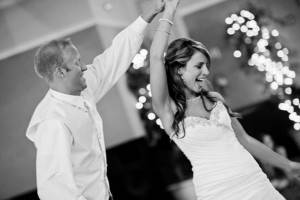
The bride can have fun, dance and take an active part in the course of her wedding. However, everything should have a limit and one should not forget about decency.
Who is the ideal wedding guest?
The presence of a guest at a wedding begins with a gift. Even if you didn’t manage to come to the feast itself, you still need to give a gift. To do this, you can bring it to the celebration itself, which is customary in Russia, or you can do it in the European style - send it to the bride’s address. According to etiquette, this is the address that is indicated on the wedding invitation, even if after marriage the bride moves to another house.

As for the cost of the gift or the amount that is given instead, each guest must adhere to one rule - this amount should slightly exceed the money spent on the guest (namely, on the banquet part). Only those close to the bride and groom can give especially expensive gifts.
Apart from the ritual part, where guests are required to shower the newlyweds with rice and sweets on time, most guests do not have any special actions at the celebration. Therefore, further etiquette on how guests should behave at a wedding largely concerns the banquet part.
First of all, during the feast you should not move too far away from the table. If you need to wipe or blot something, you should use paper napkins. A special fabric napkin needs to be laid out on your knees. Only very young children should tie it around their neck or tuck it into their shirt collar.
All drinks at a wedding are always poured by men, filling the ladies' glasses first and then theirs. At the same time, they care not only for those who came with them, but also for all the women sitting next to them, if they do not have companions. That is why there must be at least one man at each table when seating guests.
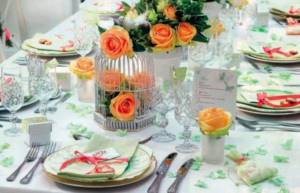
The glasses do not need to be raised particularly high. They are only slightly raised above the table. And at the moment of clinking glasses, sharp blows should be avoided - a light touch with the edges is enough, during which a melodic chime of glass occurs.
When eating food, you should adhere to generally accepted etiquette standards:
- Liquid dishes are eaten with a spoon without tilting the plate.
- Chicken and fish are eaten with a fork, not with your hands.
- Meat is eaten with a fork and knife, and meat dishes such as rolls are eaten only with a fork.
- Soft cakes, such as sponge cakes, are pricked with a fork or eaten with a teaspoon, while harder cakes are eaten with your hands.
- The tea is only stirred with a spoon. You can't drink with it.
- After the end of the banquet, spoons, knives and forks are placed on a plate rather than left on the tablecloth.
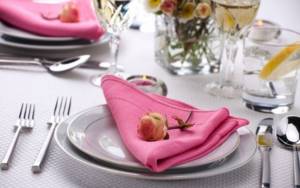
Since during a banquet breaks are most often taken to make toasts, it is also important to follow three rules:
- The toast is made only with high-proof alcohol: vodka, wine, whiskey and other drinks. It is indecent to say a toast while holding a glass of beer in your hand.
- The toast should be short and without stories about the personal lives of the young people. It's better to think about the toast in advance.
- Every toast has its time.
What if guests come with children? Only one thing is important here - the parent must completely control the behavior of his child at the celebration. It is simply unreasonable to take sick children to a holiday.
But in addition to the general rules on how to behave at a wedding, there are also several important guidelines on how not to act under any circumstances.
At whose expense is the wedding?
At the first stage of planning the celebration, the newlyweds will have to face the question of who will pay for what. Wedding etiquette has its own instructions on this matter. We will not take into account national characteristics, but will focus on the general rules of modern weddings. Typically, the bride's parents are responsible for paying for:
- full outfit of the newlywed: wedding dress, shoes, jewelry, veil;
- hair and makeup;
- invitations;
- banquet hall decoration service;
- host and musical accompaniment of the event;
- car rental.
Accordingly, the groom's parents must pay:
- groom's attire: suit, shirt, shoes, bow tie or tie;
- the bride's bouquet;
- wedding rings;
- celebration in a restaurant.
Wedding etiquette allows both parties to split all expenses in half. In the modern world, newlyweds are increasingly paying for their wedding themselves, or only partially resorting to the help of their parents. Then it becomes more difficult to distribute expenses. It all depends on what conditions both parties agree on with the parents.
The only thing that remains unchanged is that the one who pays for the celebration has a strong say in its organization. For this reason, the bride and groom most often prefer to pay for the wedding themselves in order to do everything exactly the way they want.
Wedding ceremony
Wedding is one of the Christian sacraments that takes place in the temple. Previously, marriage took place during the liturgy, and only starting from the 13th century did it become an independent rite.
Church marriage acquired its modern form by the 17th century. In the Orthodox tradition, it consists of four components - betrothal, wedding, permission of crowns and a thanksgiving prayer.
A church marriage does not have legal force, but the position of the church has not changed over the past centuries: a marriage that is not sanctified by the sacrament of wedding is considered cohabitation.
Despite the fact that the church in Russia is separated from the state, a wedding is impossible without prior registration with the registry office.
Sometimes, with the permission of the rector of the temple, the ceremony is still carried out before the marriage is concluded in a government agency. Then be prepared for the fact that you will receive a wedding certificate only after you submit registration information to the temple.
If the bride or groom is already married to a third party, then the wedding is impossible. There are other restrictions. For example, a couple baptized in the same faith can get married in a church.
Church marriage also does not take place between unbaptized people or persons who are closely related.
If there are no obstacles to the wedding, then you need to clarify in advance on which day the ceremony can be held. Thus, the church does not marry during any of the four major fasts, during the Christmastide period (from January 7 to January 20), etc.
Once the wedding day and time is set, figure out what to bring and how to dress.
Church rules impose special requirements for clothing: the bride is not allowed to wear a pantsuit or miniskirt.
The dress should be light in color, without deep necklines, and the head should be covered with a veil.
According to church regulations, on the eve or on the day of the wedding, the bride and groom attend the liturgy and also receive communion.
After civil registration, newlyweds can come to the temple either together or separately. There are no strict rules on this matter.
The next stage of the wedding day is a trip around the city. In fact, this is the most unorganized part of the celebration.
It may happen that the guests will take up all the seats in the cars of the wedding cortege and the newlyweds will simply have nowhere to sit.
Therefore, it is better to decide in advance which of the invitees will go with the newlyweds, whether those present have the opportunity to use a personal car and how many cars need to be rented.
The route of the trip is also worth considering: will it be standard, or will you want to visit other places. Keep in mind that a successful wedding photo shoot will require 2.5-3 hours.
For those who strive for originality, a horse-drawn carriage is perfect. However, we must take into account that horses are much slower than cars.
Another option for a walk is a trip on a boat or motor ship. In the latter case, you can set tables on board and arrange dancing on deck.
0 Comments
